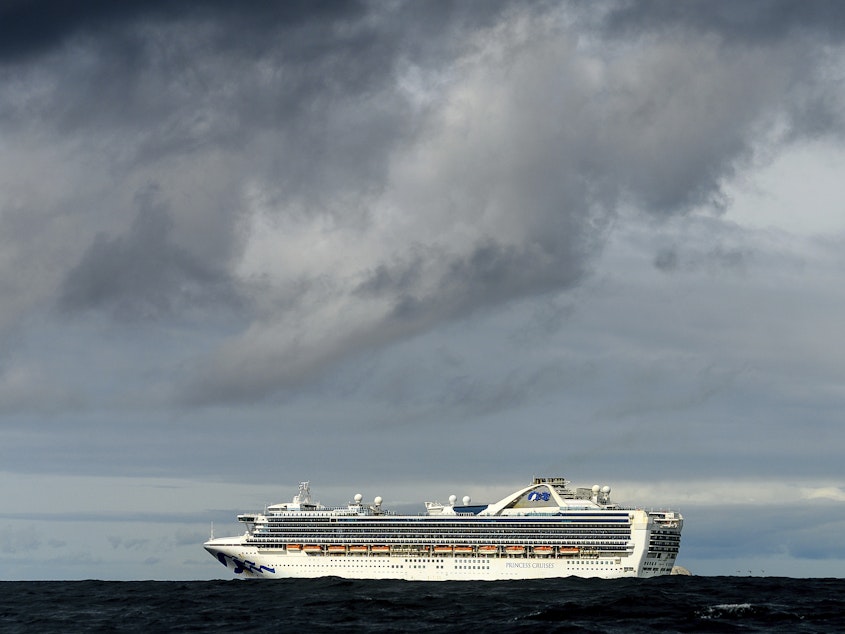Coronavirus: U.S. Has 566 Cases; Stricken Cruise Ship To Dock In California

Updated at 10:10 a.m. ET
The number of people with coronavirus in the U.S. more than doubled over the weekend, from 260 on Friday to 566 on Monday, causing school closures and other disruptions to daily life as the virus spread to new parts of the country.
Financial markets have been rattled by the outbreak and a shakeup in the oil market — and trading on the New York Stock Exchange was halted for 15 minutes Monday morning, when the S&P 500 index plummeted 7% just minutes after the open of business.
Worldwide, there are more than 110,000 cases of the COVID-19 virus, including more than 7,000 in South Korea, Italy and Iran, according to a dashboard created by the Johns Hopkins Whiting School of Engineering. France, Germany and Spain are all now reporting more than 1,000 cases.
As health officials prepare to take infected people off a cruise ship in Oakland, Calif., federal agencies are telling Americans to avoid cruise ships altogether.
Sponsored
"U.S. citizens, especially with underlying conditions, should not travel by cruise ship," the State Department said on Sunday.
"As the outbreak of COVID-19 continues, there remains a risk of infected travelers and crew boarding cruise ships," the Centers for Disease Control and Prevention said.
Those warnings come as the Grand Princess moves from its holding position 10 miles off the California coast to an industrial dock in Oakland, where it will begin unloading passengers Monday.
The ship has 3,533 people on board — including at least 21 who have tested positive for the coronavirus, out of 46 people who were in the first round of testing.
The Grand Princess has been sailing in circles off the coast since late last week, when a passenger from a recent trip died from COVID-19 in Placer County, Calif. At least one other case, in Nevada, has also been linked to that same voyage.
Sponsored
When 2,422 passengers finally get off the ship, a small number will go to hospitals for urgent care. The remainder will be divided into several groups, depending on where they're from. In addition to Americans, more than 50 nationalities are represented on board, according to Princess Cruise Lines.
"Californians are going to be taken to one of two military bases, one north, one south" in the state, NPR's Eric Westervelt reports for Morning Edition. "Depending on where they're from, other U.S. citizens are going to be taken to bases in Georgia and Texas. All will undergo a two-week quarantine. And then there are hundreds of foreign passengers. The State Department's helping to get chartered flights for them. Canada's sending a plane to collect 200 of its citizens."
It will take days to accomplish the complicated task of getting passengers off the ship, Westervelt says.
The infected people on the Grand Princess include two passengers and 19 crew members. But while the ship's guests will begin leaving the cruise ship on Monday, nearly all of its 1,111 crew members will remain on board and sail back out of San Francisco Bay.
"Plans for a crew quarantine are still being determined," Princess Cruises says.
Sponsored
To prevent the coronavirus from spreading, the CDC recommends washing hands with soap and water for at least 20 seconds, or using a hand sanitizer if a sink isn't available. The World Health Organization says people should only wear face masks if they're sick, or caring for someone who is.
"For most people, COVID-19 infection will cause mild illness however, it can make some people very ill and, in some people, it can be fatal," the WHO says. "Older people, and those with pre-existing medical conditions (such as cardiovascular disease, chronic respiratory disease or diabetes) are at risk for severe disease." [Copyright 2020 NPR]

